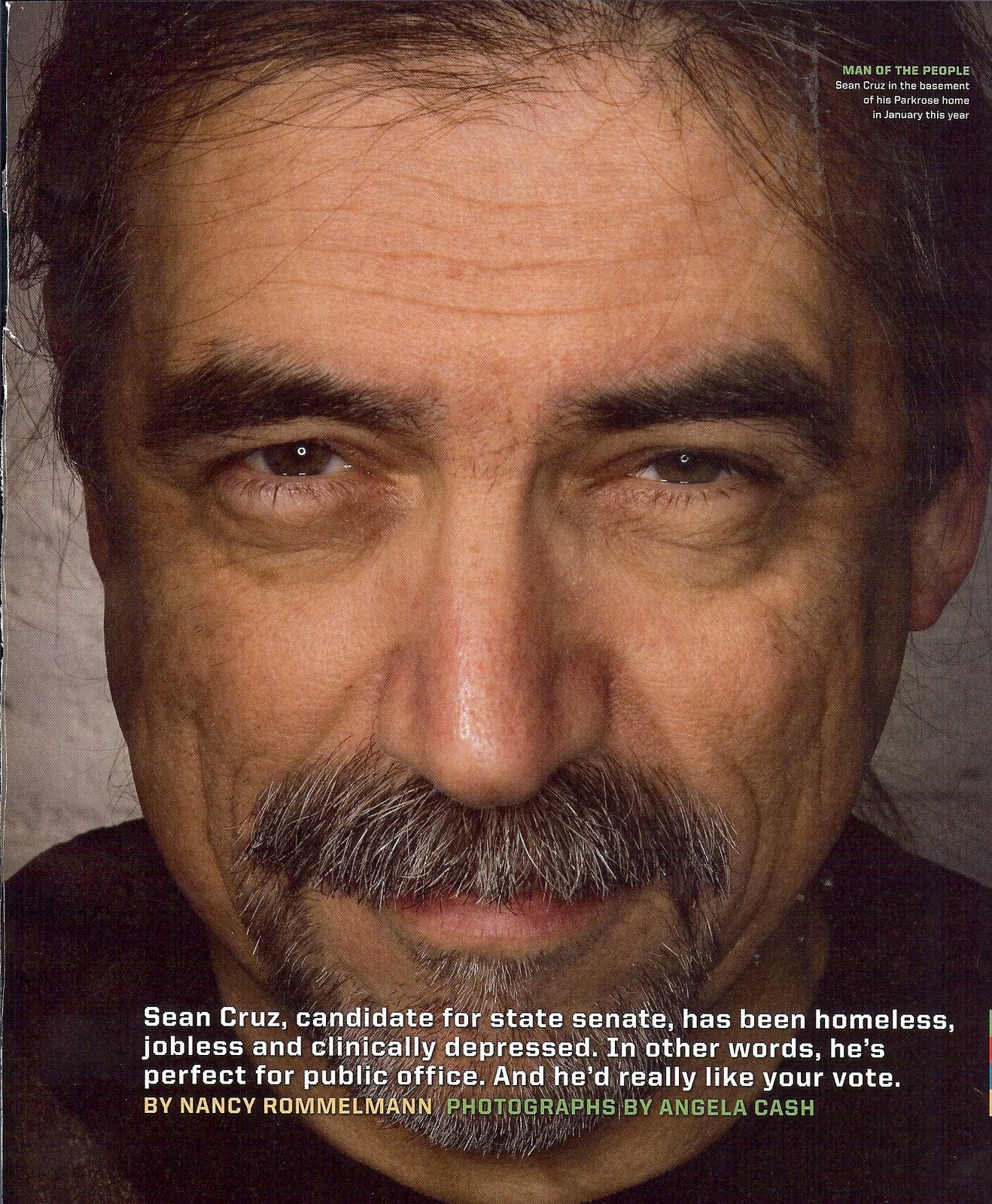By Sean Cruz
Oregon’s system of government is founded on the principle of a citizen legislature, a legislative body made of people whose life experience reflects the issues Oregonians care most deeply about, rather than of those who are efficient campaigners.
For this reason, I deliberately chose not to begin campaigning to succeed Senator Avel Gordly in the Oregon Senate until after Oregon voters had decided the fates of Measure 49 and Measure 50, both of which I supported.
Now that the citizens of Oregon have decided those measures, I am ready to begin work on an actual campaign.
At the same time, I am fully aware that the most pressing problem facing our state is the fact that we are a nation at war, and that the bill is coming due.
This issue alone necessitates a multi-part explanation of why I have decided to ask the constituents of Senate District 23 to place me at Senator Gordly’s desk in the Oregon Senate, where I have served for the past five years, where I developed a deep respect for the institution of the Senate itself.
As the son of a veteran of WWII, and as the father of a veteran of the Iraq War, I can assure you that on the 11th hour of the 11th day of the 11th month, I will be standing with our veterans and their families on Veteran’s Day, instead of out burning fuel somewhere.
For me, the occupation of Iraq is not about campaigning, it is about life and death, it is about living daily with the consequences of the Bush Administration’s catastrophic failure to act in the best interests of the nation and of the citizens of the State of Oregon.
I worry about the same issues that our veterans and their families face, the acute shortage of services across the entire spectrum of need, PTSD, IEDs, Traumatic Brain Injury (the signature injury of this war), stop-loss, multiple deployments, traumatic amputations, unemployment, homelessness…, because I am one of them, citizen father of two citizen soldiers.
This month marks four full years since both of my sons were ordered to Iraq with their Utah Army National Guard unit, after having been held on alert since the spring of 2002, four full years of unceasing worry, with no end in sight, not for years to come.
I have fought to bring the issue of the war, and of the needs of our troops, our veterans and their families to the Senate floor for three sessions, one of the few people in the Capitol with a personal stake.
In the 2007 session, Senator Gordly sponsored two bills at my request that addressed veterans issues (SJM 6), and that called for an end to the occupation of Iraq (SJM 9). The bills were heard in committee but not moved to the floor.
My testimony on the Iraq War legislation is appended below.
Also during the 2007 session, I initiated the “Request for Courtesies” action, calling for military families to come to the Capitol to bring the war to the floors of both the House and Senate.
Should the constituents of Senate District 23 decide to send me to represent them in the Oregon Senate, I vow that no day shall pass that your legislature does not face the issue of the needs of our troops, our veterans and their families while I am in office.
As a state, we are going to have to provide our children and grandchildren an economy in which they can thrive, and an education that will help them pay for the war and its long-term consequences, because that is the burden they will bear.
--Sean Cruz, November 9, 2007
Senate Rules Committee
Senator Kate Brown, Chair
Senator Ted Ferrioli, Vice-Chair
Senator Betsy Johnson
Senator Laurie Monnes Anderson
Senator David Nelson
Testimony on SM1, SJM6, SJM9, HJM9, related to the Iraq War
by Sean Cruz, April 23, 2007
Exhibits:
1. Photograph of Spc Tyler Cruz, unarmored humvee, 2004
2. Photograph of Spc Tyler Cruz, humvee with welded armor, 2004
3. Photograph of Spc Aaron Cruz, 2001
4. Certificate of recognition for Aaron Cruz, 2005
5. Letter from US Dept. of Veterans Affairs re Aaron’s medical records, 2005
Madame Chair, members of the Committee, for the record my name is Sean Cruz.
I do not intend to read all of my written testimony, which I have provided to the Committee. I would like to provide some foundational information and then stand aside for others to speak. I will remain available to answer any questions the Committee may have about the legislation before you.
I appear before you today as the father of two Army National Guard soldiers, and as a member of the Northwest chapter of Military Families Speak Out (MFSO).
There are several MFSO members present to testify today, and we all speak equally for ourselves and as some of the faces of Military Families Speak Out.
I have been a resident of NE Portland for the past dozen years. For the past five of those years, my boys have been subject to combat deployment to the war in Iraq.
My sons are: Specialist Aaron Cruz, who died in 2005 at the age of 23, largely from medical neglect while he was under military orders, and Specialist Tyler Cruz, who has at this time—at the age of 21—so far—served two year-long deployments in combat in Iraq as a .50 caliber machine gunner on a humvee.
I want to note for the record that my sons’ Army National Guard unit was first placed on alert in the Spring of 2002, ordered to pack for deployment to Iraq on 24 hours’ notice, and this April marks my family’s fifth year of continued, open-ended, actual participation in the catastrophe in Iraq.
I have provided five exhibits to the Committee to illustrate several points regarding the Iraq-related legislation before you.
These exhibits are:
(1) This early 2004 photograph of Tyler at the age of 19 shows him manning his .50 on a humvee with no armor or protection whatsoever. He is completely unprotected by even a windscreen.
(2) Later 2004 photographs such as this one showed that his unit, an engineering battalion, welded scrap steel plate for protection as best they could and, during that first deployment, he escorted convoys all over central Iraq and provided security for his unit under those conditions.
Tyler called me from the Baghdad area in 2004 and asked me if I’d heard of the “Highway to Hell.” Of course, I had.
“We paved it,” he told me, with a lot of pride in his voice. That’s my boy.
(3) This is a photograph of my son Aaron at the age of 18.
(4) This is the certificate, signed with George W. Bush, President of the United States’ very own autopen, which reads:
“The United States of America honors the memory of Aaron A. Cruz. This certificate is awarded by a grateful nation in recognition of devoted and selfless consecration to the service of our country in the Armed Forces of the United States.”
(5) The last exhibit is a copy of the letter from the US Department of Veterans Affairs, dated November 2005, in response to my request for access to Aaron’s medical records. It reads:
“Mr. Cruz’s request will be forwarded to our privacy act officer for processing of his request. He should be advised that we have a large backlog of requests for copies of records and that it may take up to a year before his request is processed. This report of contact will be faxed and serve as a final response to this inquiry.”
For the record, I have heard nothing regarding my son since receiving this letter.
It is common knowledge that the medical system is overburdened and chaotic, and there is little expectation that it will receive either the funding or the commitment it needs in order to properly care for the injured coming back from the war.
I want also to note for the record that from April 21 until April 25, 2005, I was absent from my job as Senator Avel Gordly’s Legislative Aide during the 2005 legislative session.
For those five days, I was at my son Aaron’s bedside as he lay comatose in Utah. He was pronounced dead at 4:50 p.m. on April 25, 2005.
His Utah Army National Guard unit’s entire officer and NCO staff turned out in full dress for Aaron’s memorial service and they presented his mother with a flag in his honor.
They spoke of his commitment to the unit and his despair at being left behind, due to his medical condition, which continued to deteriorate until he died.
His First Sergeant said that of the 200 soldiers he was taking to Iraq, most probably didn’t want to go, but here was one soldier who absolutely did want to go, and he couldn’t.
We buried Aaron on May 3, and 8 hours later, my son Tyler was on his way back to camp in Southern California to prepare for his second deployment to Iraq.
This is how we treat our soldiers and honor their service and their sacrifice in the real world we military families are living in.
Tyler served his second deployment in Ramadi, in Al Anbar province.
During that year, of the 4,000 soldiers and Marines fighting in Ramadi, 75 were killed and more than 1,000 were serious casualties, including many cases of Traumatic Brain Injury, or TBI, the signature injury of this war.
What has been said about the living conditions for those troops is that they lived in squalor, under fire every day and every night.
During that year, no day and no night passed without my being aware that my son—the one son I have left—could be killed or severely injured at any moment.
Aaron did not die as a result of combat in Iraq, as he would have much preferred. He died from a life-threatening seizure disorder for which he was receiving treatment while he was living with me in our home in Portland, prior to his 2003 Iraq deployment orders.
A few days after Aaron left, a letter from one of his Portland doctors arrived in the mail, warning him that he could suffer a seizure that could put him in a coma from which he would not recover, and that is in fact what happened to my son.
He concealed his medical conditions from his unit as best he could, and he called me to tell me that he had passed the Army medical exam and was going to Fort Carson, Colorado.
But Aaron was held back for at least one of the several serious medical conditions he was suffering from. As near as I can tell, he received no continuing medical treatment after he left my home and reported to his unit.
Two years later, I have no information from anyone about what happened to him medically between leaving my home and suffering the fatal seizure.
Senate Memorial 1, in line 17 page 1, refers to the deaths of 83 military personnel “from Oregon” in connection with the wars in Iraq and Afghanistan, and I want to note for the record that this number does not include my son, Aaron Cruz, although he was an Oregon resident at the time he reported for deployment.
The way this war is compartmentalized, if your soldier doesn’t die from gunfire or in an explosion, he or she isn’t a real casualty of the war, and if the soldier is from another state’s National Guard, no one pays much attention to the loss.
Now the President has announced that troops are being rotated back into Iraq again, for deployments extended to 15 months.
We military families are seeing our loved ones exposed to chlorine gas bombs now, and to shaped-charge IEDs that cut right through armor. We are seeing our troops ordered into neighborhoods, as Representative Brian Boquist described, where the streets are too narrow for the tanks and combat support vehicles they need.
The lifetime medical costs to care for some of the brain-injured soldiers returning from battle can run to $ 8 to $ 14 million dollars. Where is that money going to come from?
Will this legislature back its message to Congress with a commitment to provide the funding level that our troops, our veterans and their families need as a consequence of being a “Nation at War.?”
Is—for example—a nickel per gallon gas tax too much to ask of the Nation to help pay for the war, to finance veterans’ services for the small fraction of Americans who are actually fighting it?
I am not here to advocate for any of these Memorials as the one to support.
I believe that they each contain important concepts that merit consideration and debate by the full Senate, and I hope this Committee will decide to move them all to the floor, including HJM9, so that they can have that debate, and then bring them back to this Committee for further action.
With that statement, Madame Chair and Members of the Committee, I will stand aside so that others may speak.
----------- end of testimony
One final comment: To date, November 9, 2007, I have received no additional information regarding my son Aaron since the request in the exhibit. He apparently received no treatment for his medical condition while under Army orders, and they are not in any hurry to provide the details.
--Sean Cruz
Please forward to your lists, contact your Member of Congress:
Dear Members of Military Families Speak Out,
The Board of Directors of MFSO has just voted to endorse H.R. 3043, an appropriations bill currently before Congress, which would provide funding for critical services for our veterans, our troops and their families. We have joined with Iraq Veterans Against the War (IVAW), Gold Star Families Speak Out (GSFSO), the National Coalition for the Homeless and other organizations representing thousands of veterans and soldiers, in signing a letter which was sent on Tuesday, November 6, to every member of Congress, urging passage of this bill.
Today, we are asking all MFSO members to individually contact their Congressional representatives and Senators to ask them to support this bill and to pledge to override a threatened presidential veto. In asking you to take this action, we do not intend in any way to let Congress off the hook for their continued funding of the Iraq war. The funding in this bill is a totally separate issue from war funding votes and our support for it demonstrates our commitment to our mission to "take care of them when they get home".
While most veteran-related programs are funded through the Department of Veterans Affairs, the Departments of Labor and Health and Human Services also provide vital services to help our veterans, especially for the two-thirds of recently returning veterans who have not enrolled in the federal veterans' health care program.
Specifically, H.R. 3043 would provide:
$231 million for Veterans' Employment and Training programs to assist returning veterans to find and train for good paying jobs
$23.6 million for the Homeless Veterans' Program. Currently 23% of America's homeless are military veterans.
$10 million for those veterans suffering from traumatic brain injuries (TBI), for their rehabilitation, hospital care and long-term support. Thousands of returning National Guard soldiers rely on community-based systems of care that are not funded by the VA.
$3.4 billion for the Substance Abuse and Mental Health Services Administration. With Army suicides recently reaching a 26 year high, our returning veterans suffering from PTSD and depression have an urgent need to rely on this funding.
This bill is currently being debated on the House floor. Bush has said he will veto the bill because it does not include $3.6 billion in cuts below last year's total funding levels. As military family members, we are outraged that this administration and Congress can continue to spend $5 billion dollars a week in Iraq and yet not care if our soldiers and veterans are denied practical help in finding jobs, shelter for homeless vets, and medical and mental health care.
Please take a simple action today. Call, send a postcard to or write a letter to your representative and senator and ask them to approve H.R. 3043. Ask them not to back down from overriding a Bush veto.
To find your Member of Congress and their local mailing address, you can go to www.congress.org. You can call toll free using one of the following numbers that go right to the Capitol switchboard (ask for the office of your Senators, Representative): 800-828-0498, 800-459-1887 or 800-614-2803.
Tell them, as a military family member, what the funding in this bill will mean to your child, spouse, or loved one returning from Iraq. And tell them that passing the provisions in this bill demonstrate the kind of authentic support for our troops that every soldier and every American understands.
In peace and solidarity,
The Board of Directors of MFSO
board@mfso.org
Military Families Speak Out
P.O. Box 300549
Jamaica Plain, MA 02130
617-983-0710
mfso@mfso.org
Subscribe to:
Post Comments (Atom)






No comments:
Post a Comment